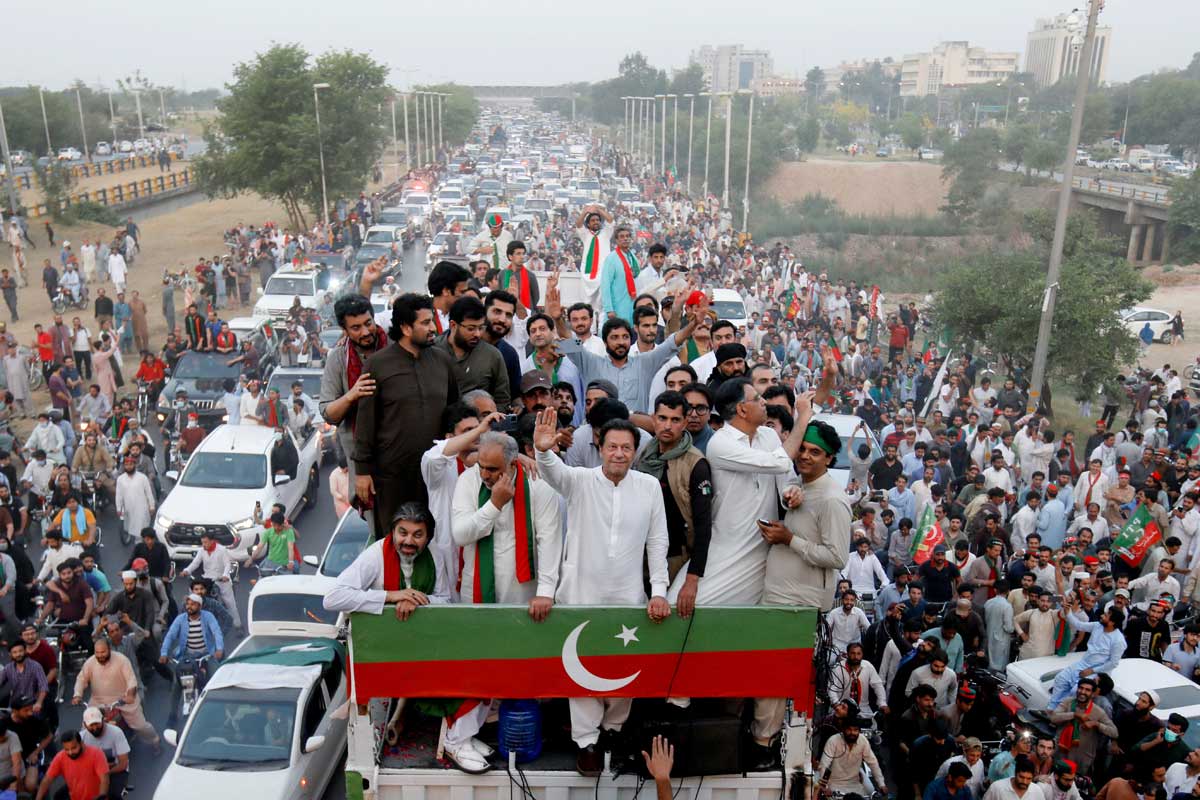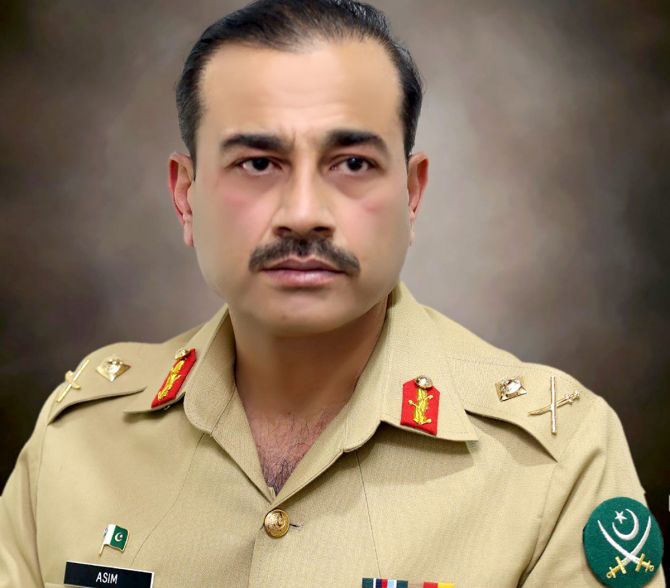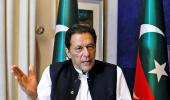'Nobody wants him to gain power.'
'But saying that all these players together conspired against Imran Khan and had him arrested would be in the realm of conjecture but possibilities cannot be ruled out.'

Former Intelligence Bureau officer Avinash Mohananey, who spent considerable time in Pakistan on security assignments, tells Prasanna D Zore/ Rediff.com why the US, China and Saudi Arabia dislike Imran Khan so much and why, if at all, they would tacitly support his arrest.
What objective could the Pakistan army have achieved with Imran Khan's arrest? Is there any strategic objective to his arrest?
He (Imran Khan) has to be kept out of the electoral scene at all costs and only then (could the Pakistan government) announce elections because neither the Americans nor the Chinese nor the Saudis would want him to be back as prime minister.
So, how to keep him out? He has to be held accountable. He's not presenting (himself) in the court. He's not allowing the proceedings to go on. There are several corruption cases against him, but the courts are not able to move (against him).
And then in every available forum, he accuses the present ISI deputy director general, Major General Faisal Nazeer, of trying to get him assassinated.
He has successfully created confusion among the people of Pakistan leading to considerable erosion in the credibility of its armed forces. People believe him more than their army.
Who is Major General Faisal Nazeer, whom Imran Khan has called 'Dirty Harry'?
This man became the deputy director general (of the ISI) after Lieutenant General Faiz Hameed, the DG, ISI, was moved out.
He (Nazeer) had worked under present Pakistan army chief General Asim Munir, when the latter was DG, ISI. This (counter-intelligence, ISI) is the crucial cell in Pakistan as it looks after the entire political landscape of the country. That is why this man (Nazeer) becomes important.
General Asim Munir brought his own man to the post and thereafter, it (the feud between Imran Khan and the army) has been continuously going on.
The problem is that Imran Khan is unhappy with the selection of the (incumbent) army chief (General Asim Munir). Neither Khan nor General (Qamar Javed) Bajwa (Munir's predecessor) was interested that he (Munir) should become the army chief.
Nawaz Sharif wanted him (Munir), so he told his brother (the incumbent prime minister of Pakistan Shehbaz Sharif) to make Munir Pakistan's army chief.
Imran is afraid that Nazeer has a lot many tricks up his dirty sleeve. There have been many audio-video leaks (showing Imran Khan in poor light) on social media making Imran Khan apprehensive about this man.

What are the chances that Pakistan could once again see a military dictatorship taking over?
Had it been few years back I would have said straight away that it should have happened. It's very difficult to say because it would be a very bad decision if the present army chief did that.
Pakistan's economy is in a continuous downward spiral. It's on the verge of default. Negotiations with the IMF (International Monetary Fund) are going on. Now, why would the army get into another mess (by imposing dictatorship) when they already have so much on their plate?
The Tehreek-e-Taliban Pakistan insurgency is creating a lot of havoc in Khyber Pakhtunkhwa (Pakistan's fourth largest province by size and third largest by population size) in its northwest region. Then they (the army) also have to deal with the insurgency in Balochistan.
You have seen the kind of attack that took place in the Peshawar mosque (on January 30, 2023) where more almost 80 people were killed. If the army were in power, the entire anger would have been directed against it and the people would have also blamed the army for this terrorist attack.
If there were to be a dictatorship in Pakistan now, people would completely lose their faith in the army and their so-called war on terror.
Can one assume that America, China, and Saudi Arabia could possibly be behind the Pakistan army's move of arresting Imran Khan?
Imran Khan happens to be a common enemy of all; nobody wants him to gain power.
But saying that all these players together conspired against Imran Khan and had him arrested would be in the realm of conjecture but possibilities cannot be ruled out.
The Americans are upset with Imran Khan because he was non-cooperative during the Taliban takeover in Afghanistan. That Imran Khan stated in one of his public speeches that the Taliban have been finally able to break the shackles of slavery (after American troops moved out of Afghanistan) didn't go down well at all with the Americans.
When he was thrown out of power, Imran Khan again put the blame of his ouster on America's doors. Given these animosity, the Americans don't trust him at all.
Interestingly, almost 80-90 per cent of textiles exports from Pakistan are to America and Pakistan depends quite a lot on the financial support from the US. In fact, America gives lot of duty concessions to Pakistani exports making them competitive in western markets.
Also, the biggest vote in the IMF (with which Pakistan is negotiating for concessional loans to tide over its economic crisis) belongs to the US and other Western countries and so Pakistan can't afford to annoy them. But Imran Khan was quite bellicose when the Americans were withdrawing from Afghanistan.
Conversely, this narrative goes against America in Pakistan because the people blame America for whatever wrong has happened to their country and Imran Khan smartly exploited this anti-America sentiment to up his popularity among the Pakistani people.
China is against him because he would, in public meetings, openly charge Shehbaz Sharif's son Hamza of visiting China to collect kickbacks in the CPEC (China Pakistan Economic Corridor) project on the contracts given to Chinese companies.
He started inquiries against Hamza when he was the prime minister of Pakistan. Because of this the CPEC project has been almost stalled since last four years; China wanted the CPEC project to be expedited so that they could keep the Americans out of Pakistan.
If Imran Khan comes to power, they are not sure whether he would again not act as a stumbling block towards China's strategic interests in Pakistan and Afghanistan. So, they too are not very comfortable with Imran Khan.
The Saudis are not happy with Imran Khan because of his efforts to start another Islamic organisation bloc in the UN with the help of Turkey and Malaysia. He was trying to create an alternative to the OIC (the Organisation of Islamic Countries), a bloc of Islamic countries over which the Saudis hold sway and is dominated and financed by Saudi petro dollars. The OIC is headquartered in Saudi Arabia.
The Saudis took this as an affront from Imran Khan and would not be too happy to see him come to power in Pakistan again.
What impact could the violence in Pakistan have on India and what precautions should we take in the light of the ensuing situation there?
This is not a celebratory time for India.
If Pakistan goes down -- as it is gradually doing so -- then you will see the rise of religious extremist elements there. The religious extremist elements have no love for India. And these people can create problems for us also.
These elements can vitiate the narrative within Pakistan against India. So whatever peace moves, that we would make at a subsequent stage, will be difficult for any political leadership (in Pakistan) to accept.










